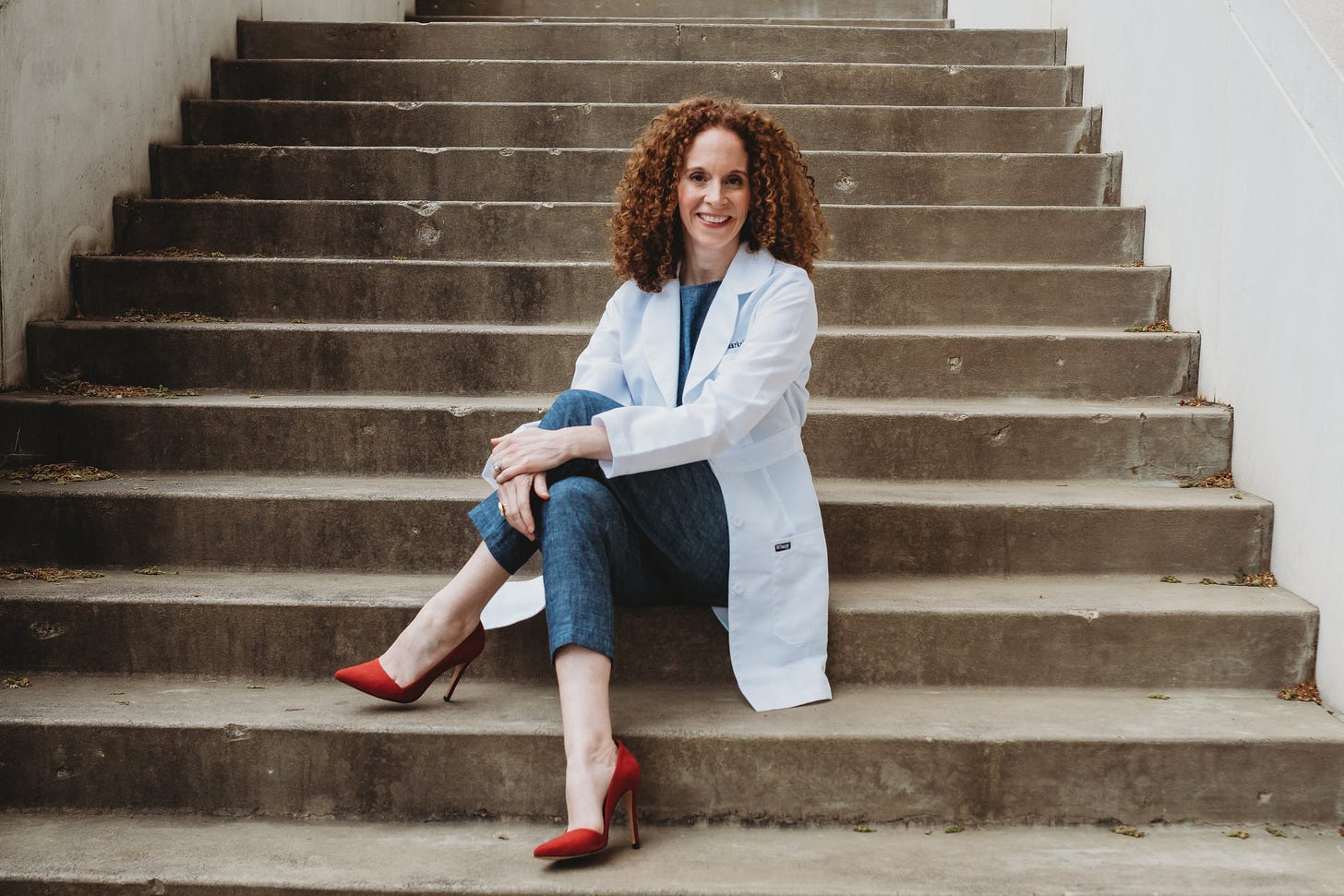The Perimenopause Playbook Your OB/GYN Didn’t Give You
90-minute visits. Real answers. Dr. Kristin Markell is changing the game
Phosis in the news: Click the links below to learn why beauty editors are falling in love with our award-winning products, Calm and Luminous. These best-sellers are back in stock in less than 30 days!
8 Makeup and Skin Care Brands Created for Women Over 40
The New Menopause: Care, Treatments and Surgeries that Will Make You Feel Radiant and Renewed
Today’s letter includes:
🦋 The Phosis Interview: Dr. Kristin Markell, a leading menopause specialist, covers the buzz on creatine, her whole-body approach, skincare, supplements, and so much more.
🦋Peri/Menopuase News: Have heavy periods? Learn why this is a symptom you definitely shouldn’t ignore.
🦋Pause: What if I told you setting aside five minutes each night could help you sleep better? Here’s a calming routine to help you do just that.

The Phosis Interview
If you’ve ever left a doctor’s appointment feeling unheard, brushed off, or told “it’s just aging,” this conversation is for you.
This week, I had the privilege of speaking with Dr. Kristin Markell, a menopause specialist who is double board-certified in Obstetrics/Gynecology and Integrative and Functional Medicine and has more than 20 years of clinical experience. Dr. Markell brings a rare blend of medical expertise and whole-person care to women navigating midlife and beyond. Her private practice is rooted in one simple but revolutionary idea: When you truly listen to women, they will tell you exactly what they need.
Dr. Markell’s approach to perimenopause and menopause is refreshingly nuanced, blending the science of conventional women’s health with the depth and personalization of functional and integrative medicine. Through her clinical work—and her own experience with perimenopause—she’s helping to change the conversation around midlife health, one woman at a time.
She’s warm, brilliant, and, like us, completely over the outdated notion that “falling apart at 40” is something we should just accept.
Let’s get into it.
Q: We hear so often that OB/GYNs don’t receive much training in perimenopause or menopause. Why is that—and how did you come to specialize in hormone health?
Great question. Honestly, hormonal health has been under-researched and under-prioritized in medicine for a long time. As OB/GYNs, we’re trained across many phases—delivering babies, doing surgeries, preventive care—but there’s only a small amount of training devoted to perimenopause and menopause.
What really shifted things for me were my patients. As they aged alongside me, they started coming in saying things like, “I turned 40 and my body fell apart.” That phrase came up over and over again. And I started thinking: Why is that? Surely we don’t all just fall apart at 40.
So I began digging into the research, learning more about perimenopause, and realized: This is exactly what they’re experiencing. Their symptoms were pointing me toward what they needed. I just had to listen.
Q: What frustrates you most about how the conventional healthcare system addresses perimenopause and menopause?
Honestly? The time constraints. Most appointments are 15 or 20 minutes long. That’s barely enough to scratch the surface, let alone unpack the complexity of perimenopause. In my private practice, a visit lasts 60 minutes, because that’s what it takes to truly understand how hormones are showing up in each person’s body and life.
One woman might have hot flashes and night sweats. Another might have brain fog and anxiety. Someone else might be dealing with joint pain from the musculoskeletal syndrome of menopause that was misdiagnosed as arthritis. There’s no one-size-fits-all. My approach is to give women the time, space, and support to explore what’s really going on.
Q: You’re trained in integrative and functional medicine. How does that shape your care?
It changes everything. It allows me to see each woman as a whole person, not just a set of hormone levels. Yes, we look at labs, but we also talk about life: stress, sleep, food, relationships, purpose. You can’t treat hormones in a vacuum.
And when you start from that whole-person view, it becomes less overwhelming. You don’t need a 20-item to-do list. One small change—improving sleep, for example—can positively affect everything else: mood, skin, metabolism, libido. The body is interconnected. We just have to treat it that way.
Q: Let’s talk about hormone replacement therapy (HRT). There’s so much buzz—and confusion. What’s your philosophy?
I see HRT as one tool in a larger toolbox. Some women want it for symptom relief or prevention. Others prefer not to use it, for a variety of reasons. Either way, my job is to educate and support.
There are real benefits to HRT—especially for bone, brain, and heart health—but it’s not the right fit for everyone. What I love about integrative care is that it allows for nuance. It’s not all or nothing. We can personalize the approach, and often combine therapies to find what works best for each woman.

Q: Creatine seems to be the supplement du jour. What’s the science there, and why are experts recommending it for women in midlife?
Yes, creatine is having a moment. It’s not just for boosting energy during resistance training, building muscle, or strengthening bones—though it can do that with a consistent training program and a well-balanced diet.
What’s even more exciting is the growing research on its brain-boosting benefits*. Recent studies show that creatine supports cognitive function, especially in tasks involving the frontal cortex (aka executive function), and it may even help enhance mood. Think sharper short-term memory, better reasoning skills, reduced mental fatigue, and a brighter outlook overall.
Q: What other supplements can be valuable for women in perimenopause and menopause?
Supplements are so personalized! And there are a few I like to consider for my peri- and menopausal patients. Magnesium, Vitamin D + K (dosed after checking levels), and Calcium. Doses will vary based on each person’s needs, but I make sure to keep Calcium supplementation under 500mg daily and encourage my patients to get the rest from their diet.
Q: Lots of longevity companies are launching at the moment, and many recommend a battery of specialized testing and labs. What are some of the tests you commonly recommend for women 40+ as part of their preventative care?
Longevity is on the tip of everyone’s tongue right now, and many new tests are being made available to people who want to invest in preventative health care.
DEXA scans can look at bone density, body fat percentage, and muscle mass because these all play a key role in longevity and health span. Some patients choose to have scans for cancer after we discuss their personal and family history and their health goals.
Advanced labs that I commonly order are an advanced lipid panel, HbA1c, hsCRP, Iron studies, thyroid panel including thyroid antibodies, along with a CBC, comprehensive metabolic panel, hormonal testing (estradiol, progesterone, testosterone, free testosterone, SHBG), B12, Vitamin D. Other labs may be added based on the patient’s needs and history.
Q: What are some of the skin symptoms that you typically see in women in menopause?
Some common skin symptoms I see in peri/menopause are dry skin, rashes, changes in the skin barrier and microbiome (rosacea), and acne. I personally experienced dry skin and a change in my skin barrier, and made changes to my diet, hormonal therapy, and skin routine to support myself.
Q: What have you found to be useful in making sure your skin looks its best?
Hydration is first on the list! Along with drinking enough water and eating more plants, I make sure my skin is able to retain moisture with hydrating perimenopause and menopause-focused products like Phosis. I support blood flow to and lymphatic drainage from the skin with a regular movement practice and facial/neck massages for tight muscles.
Q: Last question—what do you want every woman in perimenopause to know?
That your symptoms are real, they matter. And you deserve care that takes you seriously. I know it can be exhausting to go from doctor to doctor, feeling dismissed. But there are providers out there who will listen—who understand this transition and want to support you in it.
You don’t have to white-knuckle your way through this. This is a new era in women’s health, and you are not alone.
Peri/Menopause News
Do you have heavy or prolonged periods? Feeling wiped out lately? A new study published in Menopause, the journal of the Menopause Society, shows that women who report heavy or longer-than-usual periods during menopause experience even more fatigue, and experts say it’s time doctors started paying closer attention. Read more →
While awareness of perimenopause is on the rise (thank you Substack!), there’s still education to be done. A new survey from Ohio State about the perceptions of women and perimenopause shows 61% believe they will hit menopause in their 40s. When, in fact, some will start to experience symptoms as early as their 30s, and most women won’t see menopause start until their early 50s. Read more →
Maryann Jacobson, author of Midlife Strong, is a registered dietitian with a master’s degree in nutrition. I always love her thorough approach to research, but particularly love the recent piece below, which covers menopause and inflammation, and tau accumulation (a marker for Alzheimer’s Disease). Be sure to subscribe or follow—her writing is a must-read.
Pause: This Week’s Movement Snack
Whether it’s doomscrolling, perimenopause, or both (!) if insomnia’s got you down ( … or up more accurately … ), try this nighttime routine designed to calm your nervous system and prepare your body for sleep.
Cheers to looking and feeling your best,
Susan
Susan Campbell
Founder & CEO, Phosis




Enjoyed reading this interview!
Makes me interested in creatine again. Ive been very inconsistent at taking it, thinking I'm only supposed to take it when I workout, but that's not the case, is it?
Does it matter about loading first, or just take the 1 scoop recommended on the package and move on?
When my sister died, I bled for a Biblical 48 days--and indeed, I was not only in mourning but also in early peri-menopause.